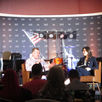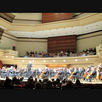Lyric Opera enlightens Chicago with Il trovatore
- Nov 29, 2018
- 6 min read

“I adore art...when I am alone with my notes, my heart pounds and the tears stream from my eyes, and my emotion and my joys are too much to bear,” said Italian opera composer Giuseppe Verdi. To deliver this composer’s unique deep feelings and his intrinsic Italian nature is a difficult task. How to present Verdi’s music and convey the thoughts and ideas that the composer originally had? Only by putting every sound of his music through your heart and letting it run through your veins. Lyric Opera of Chicago, The Metropolitan Opera, and the San Francisco Opera Association in their coproduction of Il trovatore found the best way to demonstrate the true characteristics of Verdi’s music and his extraordinary operatic talent. If you want to experience real Verdi with dramatic emotions, intricate melodic lines, sumptuous solos, polished orchestral accompaniment and vigorous choral parts, then don’t miss Lyric Opera’s Il trovatore that opened November 17 and will run through December 9.
Verdi was and still remains one of the greatest operatic composers. Each and every participant plays a vital role in Verdi’s operas, and Il trovatore is a great example of the composer’s talent and excellence. His mastery is seen in everything: the way he demonstrates main characters through their brilliant and vocally challenging solos, duets and trios, the importance of the chorus that he underlines by creating strong and dramatic choral parts, and the role of the orchestra that provides gentle and light accompaniment while emphasizing the drama that unfolds onstage. Although the plot of this opera has been criticized multiple times, Il trovatore is frequently performed around the world and is an essential part of the standard operatic repertoire.

Il trovatore translates from Italian as “The Troubadour.” The libretto was written by Salvadore Cammarano with additions by Leone Emanuele Bardare after Antonio García Gutiérrez’s play “El trovador.” As British opera scholar Julian Budden noted, the play was “packed with all manner of fantastic and bizarre incident,” but it didn’t stop Verdi from using this play as the basis for his opera. This hot-blooded tale of love, jealousy, duels, family relationships, sacrifice and retribution inspired Verdi to write music full of passion and excitement. The composer went through multiple interruptions, delays and family issues, faced Cammarano's death, found a new librettist, applied some changes to it, and finally finished the opera. This four-act opera was successfully premiered at the Teatro Apollo in Rome on January 19, 1853.
Lyric Opera of Chicago first performed Il trovatore on November 5, 1955. The opera was a success and featured such acclaimed singers as Maria Callas and Jussi Björling. Now, it again enlightens Chicago with its wonderful melodies and extreme dramatism. Sung in Italian with projected English titles by Francis Rizzo, this production features unique scenery constructed and painted by Cardiff Theatrical Services from Wales, United Kingdom.

“This work gives us opera at its most essential, its most fundamental,” wrote Lyric Opera’s General Director, President and CEO Anthony Freud in the opera notes. “The plot of Il trovatore has been criticized by some as impossibly convoluted, but onstage it works when presented to audiences with the degree of conviction that it [has] at Lyric. Sir David McVicar’s production gives us a truly memorable vision of the piece, imbued with all the darkness and the sinister dimension that so memorably distinguish the works of the painter Francisco Goya, the production’s inspiration. Lyric originated this production, co-produced with the Metropolitan Opera and San Francisco Opera. It’s been a great success in all three companies.”
Revenge is the main word that characterizes Il trovatore. It opens with Ferrando, captain of the guard, rousing the soldiers who were ordered by Count di Luna to keep watch for a troubadour who serenades Leonora, the queen’s lady-in-waiting, with whom the Count is also in love. Ferrando tells them a story of the Count’s baby brother. In the 15th century, in the Aragon, Spain, Count di Luna’s younger brother was bewitched by an old gypsy woman who consequently was burned at the stake. Her daughter saw it and paid back for her mother’s death by stealing the child. Later some unknown bones, presumably of the Count’s brother, were found in the ashes.
Leonora loves the troubadour, Manrico, but Leonora’s companion Inez disapproves of her choice. Still, Leonora is ready to die for Manrico. However, she accidentally mistakes the Count for her lover, lets him hug her, and is accused by the troubadour of infidelity. The Count is jealous and the two men fight a duel. Injured in the duel, Manrico returns back to the gypsy camp where his mother, an old gypsy Azucena, tells him that she was the one who stole the count’s baby brother and threw him in the fire, but mistakenly she threw her own child. Count di Luna arrests Azucena, who was spying on him and his people, and Manrico attempts to save his mother but also gets captured by the Count. Leonora tries to save his life by offering herself to the Count. He agrees, but she secretly takes poison. Leonora tells Manrico that he is free, he wants her to leave with him, but she refuses and makes him think she betrayed him. Finally, Leonora’s death reveals to Manrico her sacrifice for him and to the Count her devotion to Manrico. The Count orders Manrico’s execution. Azucena tells the Count that he just killed his own brother before crying out, “You are avenged, oh, mother!”

Ferrando’s narrative in the beginning of the opera is important dramatically and extremely challenging vocally. This role is performed by acclaimed Italian bass Roberto Tagliavini, whose terrifically imposing voice has colorful and flexible texture. Famous across Europe and claimed to be one of the most remarkable Italian singers of his generation, Tagliavini makes his Lyric debut performing the role of Ferrando. The rich tone of his voice, truly Italian charisma and superb vocal technique have already made Chicago audiences fall in love with Tagliavini.

The role of Leonora is performed by acclaimed American dramatic soprano Tamara Wilson, who is the 2016 winner of the prestigious Richard Tucker Award. Known for her brilliant deep voice, fabulous technique and elegant style, Wilson has earned acclaim in Mozart, Wagner, Strauss, and above all, Verdi. As a rapidly growing operatic star, she already has performed in the best opera houses across America and around the world. Wilson’s talent has previously triumphed in Il trovatore in Barcelona, Houston, Toulouse, and Mallorca, and now the singer is happy to celebrate her Lyric Opera of Chicago debut. Her sparkling presentation of Leonora delights with the deep and sincere tone of her voice, extremely beautiful high notes, tender low notes, and overall vocal flexibility and authority.

Another important role in this opera is the role of Manrico, which is performed by internationally acclaimed American tenor Russell Thomas. This skillful singer is known for his extreme artistic talent, powerful and virile voice tone and superb vocal technique. Confident, strong, emotional and very muscular - these are just a few characteristics that Thomas uses to vocally and artistically paint the personality of Manrico. His virtuosity as always delights the audience.

Count di Luna is another important personage in this opera. This controversial character is presented by celebrated Polish baritone Artur Ruciński, who belongs to a select group of Polish opera singers who in recent years have risen to international fame. Famous across Europe and in the United States for his extremely flexible, strong and sincere voice, Ruciński makes his fantastic debut at Lyric Opera of Chicago. Portraying vengeful Count di Luna, who is still a very human villain, Ruciński finds the correct colors and tones in his voice to present this character which particularly reflects in a very touching and rapturously beautiful aria about Leonora.

The role of obsessed gypsy Azucena is difficult dramatically and vocally, but celebrated American mezzo-soprano Jamie Barton knows how to vocally deliver the feelings and emotions of this old unhappy woman and performs this role with brilliance and artistry. Barton has scored great success at Lyric previously. In the role of Azucena, her tender, extremely rich and powerful voice with full and capturing low notes impresses the audience. The role of Inez is skillfully and sincerely presented by American contralto Lauren Decker, a third-year member of the Ryan Opera Center, and the role of Ruiz is presented by young and extremely talented Mexican tenor Mario Rojas, a second-year Ryan Opera Center ensemble member.
It is important to note that each aria was enthusiastically greeted by Lyric opera lovers with a round of applause. The audience also appreciated duets and trios that impressed with their extremely polished and excellent harmonies. The chorus parts definitely beautify this opera with their extraordinary power and brilliance. Such colorful highlights of the opera as the “Anvil Chorus,” Leonora’s “Miserere,” and Manrico’s stirring call to arms, to name a few, will forever remain in the sparkling musical collection of Lyric Opera of Chicago. The orchestra, directed by award-winning Italian conductor Marco Armiliato, did a perfect job demonstrating Verdi’s music with its truly Italian elegance, grace and charisma. Armiliato put this Verdi’s gem to the highest level with extreme mastery, deep understanding of Italian nature and musical characteristics, and sincere devotion to Verdi’s talent. The orchestra responded to his directions with brilliance and joy.
With these glorious voices onstage, the masterful directorship of Maestro Armiliato, the brilliance of Lyric’s Chorus and Orchestra and elegance of Verdi’s music, Il trovatore is an operatic masterpiece that can’t be missed. It runs through December 9.
For tickets and information, please go to https://www.lyricopera.org/iltrovatore or call 312-827-5600.
Natalia Dagenhart
Images: Courtesy of Todd Rosenberg
and Lyric Opera of Chicago

























Comments